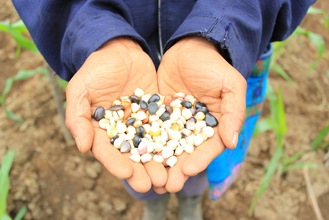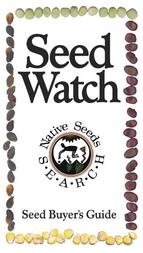How to Buy Seeds
|
Even for experienced gardeners, deciding where to buy seeds can be a perplexing challenge. Between the stacks of glossy catalogs and endless racks of packets at garden centers, the options can seem overwhelming. To make matters more complicated, the modern seed marketplace is loaded with ambiguous terminology and little detailed information. How does a conscientious gardener choose seeds that will grow well, look lovely and taste great, but also support sustainable seed farmers and healthy environments?
Your own saved seeds will always be the best possible choice for your next season’s garden. In essence you are taking the best from this season into the next as you learn to select for resilience, earliness and disease and insect resistance. |
Seed exchanges and seed libraries are also ideal choices. At the new Seed Library here in the Native Seeds/SEARCH Retail Store, you may freely “check out” seeds to return some the following season. Seed libraries are a rising trend within public book-lending libraries across the country, with dozens of new community seed reserves recently cropping up between the bookshelves. This is an inspiring movement and a path to true sustainability — locally adapted seeds, collectively cultivated and freely exchanged! One important thing to understand when it comes to buying seeds is that most seed companies do not grow the seed they sell. (Native Seeds/SEARCH’s collection is an exception, as 99% of the seed it sells is grown locally.)The majority of seed companies are “packers” — that is to say, companies that buy seed in bulk from growers or other companies, repackage it, and sell it as their own. This is not necessarily a bad thing. However, when the actual source of the seed is unknown to consumers, the advantages of buying local seed are lost.
A key word to understand when buying seeds is hybrid, or “F1.” If you see this adorning a seed packet, keep in mind that you won’t be able to save seed easily from these plants. Hybrid seed is the 1st generation offspring (F1) from two distinctly different parents. To get the same quality crop, gardeners must purchase fresh seed every year. The garden seed industry loves to sell hybrids for this reason.
Open pollinated seeds are essentially the opposite of hybrids and reproduce relatively “true to form.” Offspring from the seeds of the parents resemble the plants originally sown. This makes seed saving easier. Aside from being thrifty, saving seed builds up local genetic diversity and beneficial adaptations. Seed saving can be easy or tricky, depending on the plant; for the best results, always start with “open-pollinated” seeds rather than hybrids.
A key word to understand when buying seeds is hybrid, or “F1.” If you see this adorning a seed packet, keep in mind that you won’t be able to save seed easily from these plants. Hybrid seed is the 1st generation offspring (F1) from two distinctly different parents. To get the same quality crop, gardeners must purchase fresh seed every year. The garden seed industry loves to sell hybrids for this reason.
Open pollinated seeds are essentially the opposite of hybrids and reproduce relatively “true to form.” Offspring from the seeds of the parents resemble the plants originally sown. This makes seed saving easier. Aside from being thrifty, saving seed builds up local genetic diversity and beneficial adaptations. Seed saving can be easy or tricky, depending on the plant; for the best results, always start with “open-pollinated” seeds rather than hybrids.
|
Generally, buying organic seeds is a great idea.Beware, however of a new marketing niche being exploited by large industrial seed companies: “organic hybrids.” Keep in mind when purchasing them, seed saving will be difficult (although not impossible). An important point to remember is that we have lost up to 96% of the plant diversity available to farmers since the turn of the last century.Most of what is left is not yet certified organic.Never let the organic label keep you from bringing new diversity into your garden.Grow it organically yourself, save the seeds, and you’ve added another variety to the organic seed world. Recently Native Seeds/SEARCH produced a seed-buying guide called Seed Watch. This handy booklet has all the information you need to make informed, sustainable seed purchases. In short: keep it local, natural, and small-scale and you’ll be growing the healthiest plants, while doing the most good for your community and the world.
|


